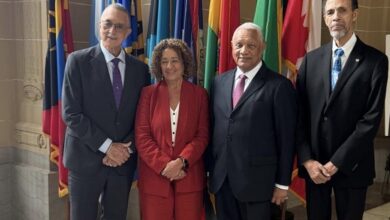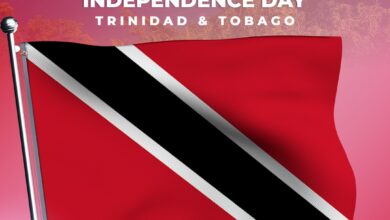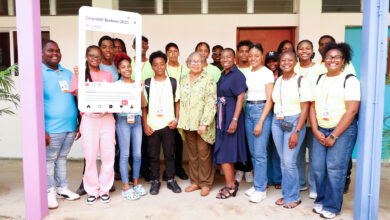(CARICOM Secretariat, Turkeyen, Greater Georgetown, Guyana) The Thirty-Fifth Meeting of the Council for Trade and Economic Development (COTED) concluded on Tuesday 11 December 2012, after two days of deliberations that ranged from matters related to the full and effective participation of all Caribbean Community (CARICOM) Member States in the CARICOM Single Market and Economy (CSME) to confronting high fuel and food prices, and external trade relations.
The discussions in Georgetown, Guyana, were conducted following a charge delivered by Ambassador Lolita Applewhaite, CARICOM Deputy Secretary-General for Member States to consider regional arrangements as supportive and as investments for increased benefits and to fully utilize the strength of the integration movement. Against that background, the Ministers and heads of delegations took decisions on a number of issues including:
The full participation of Belize, Haiti and the Organisation of Eastern Caribbean States (OECS) in the CSME: Attention was focused on how Belize, Haiti and the OECS could better benefit from the CSME. The discussions were based on an initial report that identified factors that were limiting the full integration of those Member States in the CSME, as well as on a report that proposed implementation plans and financing for each of the solutions. Discussions also centred on the financing of the undertaking; the ownership of the exercise and the role of COTED. The Meeting mandated that a task force be established to move the process forward, particularly with regard to identifying the main priorities for intervention and identifying financing. The task force, comprising representatives of the OECS, Belize, Haiti, Barbados, Caribbean Export, the University of the West Indies (UWI) and the CARICOM Secretariat, will tender its first report in July 2013.
The effects on the Community of the rising cost of fuel and commodities: Extensive and robust discussions were held on the persistent high food prices occasioned, in part, by global decline in cereal production. The Meeting was advised that the impacts of high food prices will continue to be felt in 2013; that the price of petroleum continue to affect the agriculture production costs and distribution, and that those prices will not return to relatively low sustainable levels. Among the items that are expected to be most affected are animal-based food products. The Region’s poor, the Meeting recognized, will continue to be affected by the rising cost of living. The Common External Tariff (CET) – identified in 2008 as one immediate avenue to ease the burden of high prices on the Region – was again singled out as the way forward. Recognition was given to the measures being adopted under the Community Agriculture Policy and the Regional Agribusiness Strategy. In addition, as agriculture was considered critical to reducing the high food import bill, ensuring food and nutrition security, and combating non-communicable diseases, the Meeting called on Member States to urgently pursue the removal of the key binding constraints to agriculture production. Please see link enclosed http://www.caricom.org/jsp/pressreleases/press_releases_2012/pres323_12.jsp
The effects of subsidies on rum granted by the Governments of the United States Virgin Islands (USVI) and Puerto Rico to multinational rum producers on the Caribbean Rum Industry were considered in the context of the Region’s external economic and trade relations: In recognition of the deleterious impact of the US rum subsidies on the Region’s private sector and on Member States generally, the Meeting issued a statement in which it extended support to the industry and called for dialogue with the US. The Ministers also declared their intention to pursue all avenues to secure the competitive balance for its rum markets. The Ministers pointed out that rum was the major agriculture-based export industry of the Community and was critical to the economic and social wellbeing of the Region. The rum industry is also a substantial employer and a major contributor to foreign exchange earnings and government revenues. Please see link enclosed http://www.caricom.org/jsp/pressreleases/press_releases_2012/pres321_12.jsp
In the realm of external economic and trade relations, the Meeting also discussed negotiations for the CARICOM-Canada Free Trade and Development Agreement. A report on the outcome of the Fourth Round of Negotiations was presented. The Community proposed to convene the Fifth Round as soon as possible in the new year.
Ministers also held discussions on the Fourth Meeting of the Joint Council under the CARICOM-Dominican Republic Free Trade Agreement held in May 2012; updating the Trade and Economic Cooperation Agreement between CARICOM and Cuba; and the Region’s participation in the Community of Latin American and Caribbean States (CELAC)
Approval of Regional Aid for Trade Strategy: The Meeting approved the CARICOM Aid for Trade Strategy which will be submitted to the CARICOM Heads of Government for endorsement. A public launch will follow the endorsement and it is anticipated that Mr. Pascal Lamy, Director General, World Trade Organisation (WTO), who has offered to champion the Strategy, and Mr. Luis Alberto Moreno, President of the Inter-American Development Bank (IDB) which provided financial and technical support, will participate in the launch.
The Strategy was written following national consultations in Member States, and, in the case of the Bahamas, written submissions. The strategy’s goals are: Improved efficiency and reduced cost of maritime transport. Increased competition in delivery of broadband services to promote increases access. Accelerated development and use of renewable and alternative energy sources Strengthened production and export capacity of the private sector. The Strategy will be updated as new priorities, and mandates provided by the Heads of Government, are identified.
Adoption of Regional Standard on Tobacco Labelling: The Meeting made a landmark unanimous decision to adopt a regional standard on the labelling of retail tobacco packaging in accordance with the World Health Organisation (WHO) Framework Convention on Tobacco Control (FCTB). Under Article 11 of the Convention, countries which are a party to the Convention are required to adopt and implement effective measures – within a period of three years after entry into force – to ensure tobacco packages are labelled according to guidelines developed by the WHO FCTC Secretariat. Please see link enclosed. http://www.caricom.org/jsp/pressreleases/press_releases_2012/pres322_12.jsp
Congratulations to OOCUR: The Meeting extended congratulations to the Organisation of Caribbean Utility Regulators (OOCUR) on the occasion of its tenth anniversary and acknowledged the importance of its role as an umbrella organization that promotes independent, efficient and transparent utility practices. A regional organization established in 2002, OCCUR aims to foster the development of autonomous regulators in the Caribbean to facilitate the sustainable economic growth and development of Member countries and the people of the Region.
The Thirty-Sixth Meeting of the COTED is scheduled for April, 2013.





